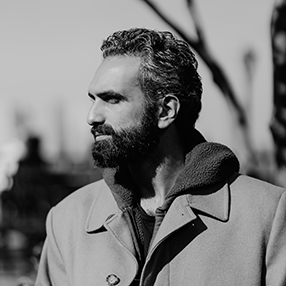He came back from halfway around the world like that,
tongue tied around him like a scarf. Everything set before him
set to bursting. The fear that what he’d seen—
what had been inside him—that one
clear note—now would slip away. He’d go back
to an electric life, stupid with administration.
How does one re-enter a calendar?
He was still in love with the yellow dirt seen at the hour
of the museum’s closing, two weeks before the Palio.
With the sound he almost certainly heard his blood make
as he ate the last bite of liver toast
and finished off his wine, at night, in a tower beside
a total field. Or the remarkable look
a girl had given the bushes at 3 a.m.
on a hill above the Aegean before she let him
pull her pool-soaked dress up above her thighs.
He was still in love with all the cataclysms in his flesh.
Even though none of that was real anymore.
And it was his human duty to go onward, forget it all,
get caught back up in the cloud of the thing.
The next morning he woke up, fully home,
ignorant as ever, just perhaps a light along the edge
of responsibility, the tasks that called him by a name.
As if their stress and weight existed only didn’t.
A brief glimpse, and then that part of what’s just in the mind
scampering back into undergrowth. (They called it capriola,
which was perfect.) And then—drawing himself out of bed
and lacing up his shoes. Getting out and running among
buildings, the stacked reds and blues of Brooklyn. Gaping
at the faces of his neighbors, or the way a leaf hangs,
or a swatch of pavement wet between parked cars.
Huffing widely at it, and running a little slower.
Gathering it all up into his mouth.
Copyright © 2016 by Jay Deshpande. Originally published in Poem-a-Day on December 9, 2016, by the Academy of American Poets.
“There is an art to holding onto beauty and an art to letting it go. I am far more desperately practiced in the former. A couple years ago I had the opportunity to set down my regular routines and travel very freely. I wanted to write a poem that could serve as testimony to that experience, but could also acknowledge its passing. Sometimes letting go of beauty yields the greatest beauty of all: returning to your life, to the warm rooms of the familiar, and seeing it turn wild and vivid in front of you.”
—Jay Deshpande

